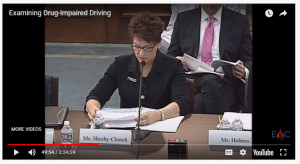
Last month, I had the honor to once again testify in Washington D.C. in front of members of the U.S. Congress at the House Energy and Commerce Committee’s Subcommittee on Digital Commerce and Consumer Protection.
I joined three other panelists to examine the drug-impaired driving that is an increasing part of our society today and another hazard to our highways and roadways.
All panelists concluded that while drugs are playing a larger part in impairment across the country — alcohol is still the leading drug and killer on our roads today.
On July 10, 2004, my son Dustin Church was killed by a drunk and drugged driver. I come to this hearing with a different perspective and years of education around alcohol-impaired fatalities. No parent … no one should go thru the pain of knowing your child is dead because of someone’s choice to drink and do drugs and then drive a vehicle.
How to fight drugged driving?
The good news is that the best way to combat drug-impaired driving is to do more impaired driving enforcement. MADD believes that stopping drunk and drugged driving begins with strong law enforcement. I encouraged the Energy and Commerce Committee to work with law enforcement across the country to emphasize the importance of traffic enforcement.
In 2015, MADD updated our mission statement to include “help fight drugged driving.” As one of the largest victim’s assistance organizations in the country, we want victims of drugged driving to know that we are here to serve their needs. We also know that the legalization of recreational and medicinal marijuana, the national opiate crisis and the prevalence of prescription drugs in our society can only lead to more drug impaired driving on our roadways. What we don’t know, however, is the role of drugs as causal factors in traffic crashes. This is why more research is needed.

MADD relies on research and data to make informed public policy recommendations. Since our founding in 1980, we have led the way on every major drunk driving reform in our nation. The 21 minimum drinking age, zero tolerance laws and the national .08 BAC standard are just a few of the major policy initiatives MADD has championed to help cut drunk driving deaths in half since 1980.
Join the fight
Our Campaign to Eliminate Drunk Driving (CEDD) has created the national blueprint to eliminate drunk driving and we must do more work on drunk driving. MADD encourages Law Enforcement all across the country to make traffic enforcement a priority.
My ask to the congressional committee was to reinstate and fund the National Roadside Survey which is critical to having data points on drug presence. We (MADD) urged the committee to work with their colleagues to restore funding for the NRS. We also need to know how marijuana impairment influences driving behaviors …we need answers to these questions and those around more testing to determine how many drivers are using drugs.
It is critical that we have research and data to better understand the problem of drugged driving. For now, our great law enforcement is our best defense against drunk and drugged driving.
I thanked the committee for the opportunity to testify and be the voice of our victims. I will continue to stand for you until we have NO MORE VICTIMS®!


